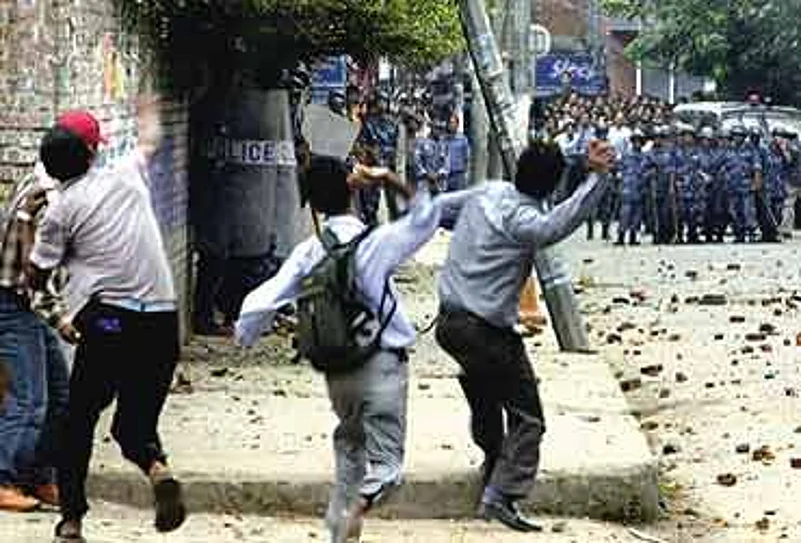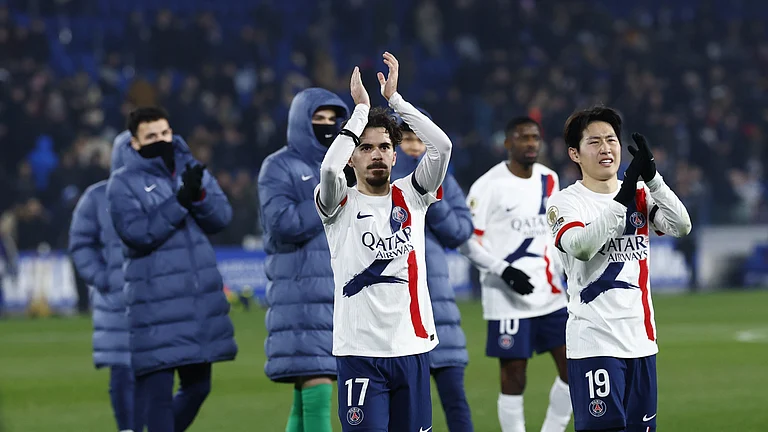When a convoy of 18 trucks from China swept down the Kodari highway to Kathmandu, under a heavy escort of the Royal Nepal Army (RNA), the political class here began speculating on the consignment which had arrived in the night of November 22-23. But the cloak of secrecy was lifted the following day as RNA spokesperson Brig Deepak Gurung confirmed, "We have procured some non-lethal weapons." He refused to provide specific details but it is believed that the cargo from China included 4.2 million rounds of 7.62 mm rifle ammunition, 80,000 high-explosive grenades and 12,000 AK rifles.
The news about the arrival of 18 trucks in Kathmandu brought back to memory the crisis of 1987. Then, too, Nepal had procured arms from China, provoking India to retaliate through an economic blockade of the land-locked country. The ensuing economic hardship had triggered unprecedented anti-royalty sentiments. Glossing over the lessons of history, and cocking a snook at New Delhi, King Gyanendra has signalled, through the purchase of arms from China, that he isn't as yet going to relent to pro-democracy forces, which have been arguing against resumption of arms supplies to the RNA until the king unequivocally restores democracy.
For long, Gyanendra has been threatening to play the China card. The February 1 royal coup had goaded India into suspending arms supply to the RNA. Restore democracy first, New Delhi had demanded as a precondition. In subsequent official meetings, the king's government laboured the point: would India want the RNA to run out of ammunition and lose the battle to 'terrorists' (read Maoist insurgents)? Simultaneously, officials began to harp on the need to develop alternative sources of arms should India, and the international community at large, continue to starve the RNA of fresh supplies. They claimed that the situation in Nepal was perilous, pointing to American assessments that Kathmandu could fall to the Maoists in case the king and the 'constitutional' forces did not align.
Nepal's decision to procure arms from China was reportedly deferred till the last moment. Back in April, King Gyanendra had been able to secure a commitment from Indian Prime Minister Manmohan Singh during their meeting in Jakarta that New Delhi would supply the 'arms in the pipeline'. But the king's decision to prematurely go public about Manmohan's commitment prompted the Left to oppose the move. Since then, the situation only worsened for him. Only last month, President George Bush signed a total arms embargo on Nepal. Prominent Senator Patrick Leahy even went to the extent of appealing to the RNA to defy the king should he deploy the army against the democratic movement. Bush's position echoed the sentiments of other western powers, including the European Union, leaving the embattled king with just a handful of countries to whom he could turn for bolstering the morale of the RNA and retaining its fealty.
The king's decision to purchase arms from China has a wider canvas. Weeks before the 18 trucks from China arrived in Kathmandu, Gyanendra had signalled his intention to align with Beijing during the SAARC summit at Dhaka. Then he had led the initiative to accord China an 'observer' status in the SAARC, and linked his idea to the issue of accommodating Afghanistan in the South Asian grouping. The SAARC, however, decided to evolve a set of criteria for granting observer status to other countries, effectively postponing the issue.
Yet, analysts here feel China's entry into SAARC even as an observer could make it a legitimate rival to India in South Asia, where the dominance of New Delhi is nonpareil. Against this backdrop, Nepal's move isn't just a case of a desperate king pulling out all stops for his survival; it's more about an ambitious king playing off China against India; of threatening to provide Beijing a toehold in the Himalayan kingdom should New Delhi not relent to his demands; of attempting to whittle down India's clout in its very neighbourhood.
Gyanendra's China card could provoke India to retaliate a la 1987. Nepal enjoys crucial economic privileges from India. For instance, the Bilateral Trade Treaty, due for revision in 2007, allows duty-free, quota-free access to Nepali goods on a non-reciprocal basis. India accounts for nearly 65 per cent of Nepal's exports. A revision of the treaty to the detriment of Nepal could weaken its economy—and engender anti-king sentiments. Hundreds of Nepalis flock to India for jobs. It's debatable whether China can extend such privileges to Nepal.
India hasn't yet officially commented on the arms purchase. In Dhaka last month, though, Manmohan Singh had conveyed to the king that India would resume arms supply only to a democratic regime. New Delhi is bound to perceive the recent arms purchase as inimical to its interests. Others like the US and the European Union have voiced their resentment. They had, in the past, advised China not to provide military support as it would make Nepal politically unstable and strengthen an authoritarian regime.

Nepal's foreign minister Ramesh Nath Pande—supposed to be the architect of the king's China policy—during his July visit to China, had extracted concessions from Beijing: a grant of Rs 87 million to Nepal, with no pre-set terms on how Kathmandu would spend the money. The grant saw several senior officials, including chief of army staff General Pyar Jung Thapa, fly down to Beijing. It was during Thapa's trip, sources say, that final shape was given to the idea of purchasing arms from the money China had earlier provided. Then followed defence secretary Bisnu Dutt Upreti, who placed the order for two 60-seater aircraft, each costing around $10 million.
China not only describes the king's February 1 takeover as Nepal's internal affair, but has expressed its readiness to assist the RNA in crushing the Maoists. This has endeared Beijing to the palace. But isn't the price of seeking China's help too high for Nepal? "Of course, we are going to solicit China's help if India and other countries demoralise the RNA and equate it with terrorists," a minister told Outlook. He was referring to the recent agreement between the Maoists and the seven pro-democracy political parties which, among other things, includes placing the RNA and the Maoists under the United Nations supervision to conduct a free and fair poll to the Constituent Assembly.
Respected Supreme Court lawyer Kusum Shrestha says equating the RNA with the Maoists would provide an excuse to the king to continue with his "megalomaniac lust for power". Others fear this could see the king courting China brazenly, even risking international isolation. His China card stems from his disappointment over India's reluctance to endorse the February 1 coup and his bid to assume an enhanced role domestically. India has, in fact, hardened its position against him. The change, observers say, arises from New Delhi's fears that the popular disenchantment against the king could swell into a groundswell for abolishing the monarchy and turning the kingdom into a republic.
Foreign policy experts, however, feel it won't be correct to cite the recent arms purchase as the king's decision to firmly align with Beijing or sign a defence pact with China, seeking some form of direct intervention. But it's no doubt a step towards reducing traditional dependence on India for purchase/supply of arms in hours of need. This also means that the king wants to begin his inevitable journey towards democracy on his own terms, than under the pressure of India and its pro-democracy allies.

























